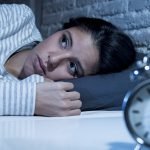Remember how your parents used to put you to bed when you were a small child? The routine probably involved a bedtime story and a kiss. Now, as an adult, it might not be so bad to revisit that childhood tradition instead of all of the media activity most of us have come to rely on late into the night. Because, according to the 2011 Sleep in America poll taken by the National Sleep Foundation, most of us are not getting a good night’s sleep on most nights…and one of the main reasons why, it turns out, is that we are staring at a screen before bed.1
The poll respondents ranged in age from 13 to 64 years old. Sixty percent of them claim to have sleep issues either every night or nearly every night. These can include waking up during the night, not feeling well rested upon waking in the morning, waking up earlier than planned, and so on. And most people reported not getting enough total hours of sleep. During the week seems to be especially bad, with people rising early for work or school, resulting in 63 percent not receiving the amount of sleep they need. The average on a weeknight for adults was 6 hours and 55 minutes per night. But approximately 15 percent of adults and seven percent of 13-to-18-year-olds said they regularly sleep for less than six hours on weeknights.
A large part of the problem stems from the fact that almost everyone is making use of media in the hour before going to bed. At least several nights a week, 95 percent of the participants report engaging in some form of screen-based technology close to bedtime. Depending upon the age and particular preferences of the person, the type of electronics varied between watching television, using a smart phone, going on the computer, and playing a video game. Approximately two-thirds of those over the age of 30, and half of those under 30, watch TV before going to sleep.
Any type of screen time right before bed is a no-no, say the sleep experts. The proximity to so much artificial light after sundown messes with our internal clocks and causes the body to not release enough melatonin, which is the hormone that helps us feel sleepy. It also increases feelings of alertness, probably starting a vicious cycle in which we say, if I’m not feeling tired, I’ll just watch one more show or play one more game.
And sadly, televisions are probably the least of our problems. They are considered a “passive” form of media entertainment in which we really do not have to engage ourselves or do anything. Surfing the web, playing video games, chatting up a friend, or texting all use more “interactive” skills that will do even more to heighten our alertness and wakefulness at bedtime. So the 61 percent of participants of all ages who spend the last hour of their night on the computer and the 36 percent of teens and 28 percent of young adults who spend it playing video games are in an even less drowsy state than the TV watchers when bedtime rolls around.
Lack of sleep, even for a short-term period, has been linked in research to numerous health issues. Studies have shown that sleep deprivation increases your likelihood of getting type 2 diabetes due to lowered glucose tolerance and increased insulin levels.2 This causes the body to store fat, which jives with other studies that have found that lack of sleep promotes obesity. Other research has found connections between a lack of sleep and acceleration of the aging process,3 mental disturbances relating to exhaustion and an over-emotional state,4 and reduced immune system function,5 which can put you at increased risk for everything from colds to cancer.
If you want to start getting a better night’s sleep, turn your technology off. Use it all you want throughout the day, but in the evening — well in advance of bedtime — stay away from the screens. Try some good, old-fashioned fun before bed to prepare yourself for slumber. Read a book (but not on your Nook), stretch out each different part of your body in bed for relaxation, or spend the time with your significant other talking with the lights off. Chances are good that your lack of sleep will catch up with you, and you’ll be falling asleep in no time!
1 Williams, Jennifer Cowher. “Annual Sleep in America Poll Exploring Connections with Communications Technology Use and Sleep.” National Sleep Foundation. 7 March 2011. Accessed 29 Jan 2012. <http://www.sleepfoundation.org/article/press-release/annual-sleep-america-poll-exploring-connections-communications-technology-use->.
2 Darukhanavala A, Booth JN 3rd, Bromley L, Whitmore H, Imperial J, Penev PD. “Changes in insulin secretion and action in adults with familial risk for type 2 diabetes who curtail their sleep.” Diabetes Care. 2011 Oct;34(10):2259-64. Epub 2011 Aug 11. <http://www.ncbi.nlm.nih.gov/pubmed/21836106>
3 Copinschi G. “Metabolic and endocrine effects of sleep deprivation.” Essent Psychopharmacol. 2005;6(6):341-7. <http://www.ncbi.nlm.nih.gov/pubmed/16459757>
4 Wessely S, Chalder T, Hirsch S, et al. “Psychological symptoms, somatic symptoms, and psychiatric disorder in chronic fatigue and chronic fatigue syndrome: a prospective study in the primary care setting.” Am J Psychiatry. 1996 Aug;153(8):1050-9. <http://www.ncbi.nlm.nih.gov/pubmed/8678174>
5 Michael Irwin, John Mccuntick, Carolyn Costlow, Meussa Fortner, Jack Wihte, and J. Christian Gillin. “Partial night sleep deprivation reduces natural killer and cellular immune responses in humans.” Psychosomatic Medicine 56:493-498 (1994) <http://www.psychosomaticmedicine.org/content/56/6/493.full.pdf>












In this test, did they
In this test, did they examine people that did not have technology stimulation before bed, but still had sleeping difficulties? I'm not sure the conlusions you jumped to are correct and giving a half truth like this does more harm than good, in my experience. When I present this kind of argument to my kids, who do not sleep well and do have lots of computer stimulation, they just poke the obvious holes in your discussion and dismiss it. I personally think the "findings" are probably correct, but presented this way leads to lack of belief in the findings.
There was a link to a
There was a link to a detailed report concerning the study. It was not a test, but an ongoing poll of 1,508 individuals. The National Sleep Foundation began surveying American sleep health and behaviors in 1991. The 2011 Sleep in America® annual poll was conducted for the National Sleep Foundation by WB&A Market Research, using a random sample of adults between the ages of 13-64. The margin of error is 2.5 percentage points at the 95% confidence level. The results of the poll establish an extremely strong statistical connection between lack of sleep and poor sleep and the viewing of media screen light sources before bed. It is what it is – not proof, but a strong statistical connection. For information, check out the link: http://www.sleepfoundation.org/article/press-release/annual-sleep-america-poll-exploring-connections-communications-technology-use-
As for your kids, you can always propose an experiment to them. Stop viewing media screens for one hour before bed for one week and see if they sleep any better. At that point, if they do sleep better and still insist on returning to their previous habits, you have a problem that no amount of “logic” will solve.
Disagree with this article.
Disagree with this article. If you read a book on an electronic device using its NIGHT MODE (!), meaning light letters on black background (ideally on an OLED screen = perfect 100% pitch-black background), this in fact exposes you to *less* light than “reading a book” (for which you need a *lamp* radiating *bright light!), which the article inconsequentially recommends as a bedtime activity.
You’re not disagreeing with
You’re not disagreeing with the article then; you’re disagreeing with the research from the National Sleep Foundation about which the article reported. It would be interesting to learn if they differentiated for Night Mode viewing.
That is the trouble: most
That is the trouble: most people seem to have no idea that something like “Night Mode” even exists on electronic devices. I suspect, however, that if experts precisely measured how much “artificial light” is emitted by an electronic device in Night Mode, and how much by an ordinary lamp, it might turn out to be a ratio of something like 1:20, in *favor* of the electronic device.
I find it distinctly more relaxing to read a book on my iPad in Night Mode in an otherwise completely dark room, than to read a paper book lit by a lamp (which is more uncomfortable if only because you must keep holding the book pointed towards the source of light, which tends to be uneven, depending on your position in bed or chair, which tends to change).
Yet no one is suggesting we avoid switching on our lamps after sundown, and spend our time before bed in darkness, are they? 🙂 And so, much of the railing against electronic devices (not only in this regard) seems to be based on a lack of familiarity with their functionality.